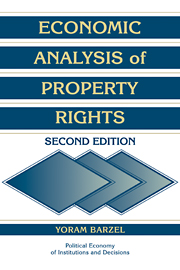Book contents
- Frontmatter
- Contents
- Series editors' preface
- Preface to the second edition
- Preface to the first edition
- Introduction
- 1 The property rights model
- 2 The public domain: Rationing by waiting and price controls
- 3 Contract choice: The tenancy contract
- 4 Divided ownership
- 5 The old firm and the new organization
- 6 The formation of rights
- 7 Slavery
- 8 Wealth-maximizing constraints on property rights
- 9 Property rights and non-market allocation
- 10 Additional property rights applications
- 11 The property rights model: Recapitulation
- References
- Index
6 - The formation of rights
Published online by Cambridge University Press: 05 June 2012
- Frontmatter
- Contents
- Series editors' preface
- Preface to the second edition
- Preface to the first edition
- Introduction
- 1 The property rights model
- 2 The public domain: Rationing by waiting and price controls
- 3 Contract choice: The tenancy contract
- 4 Divided ownership
- 5 The old firm and the new organization
- 6 The formation of rights
- 7 Slavery
- 8 Wealth-maximizing constraints on property rights
- 9 Property rights and non-market allocation
- 10 Additional property rights applications
- 11 The property rights model: Recapitulation
- References
- Index
Summary
Having analyzed the causes that allow properties to be kept in the public domain, I can now address the issue of the formation of economic (though not necessarily legal) rights. It might be tempting to trace the pattern of currently existing property rights holdings to its point of origin to determine how and why it came about, yet such an effort would be futile. The ability to consume commodities, including those necessary to sustain life, implies the possession of rights over them. Once this is understood, it becomes clear that one cannot expect to discover any evidence of a pre–property rights state, since it is not possible to endow a pre–property rights state of affairs with meaning. In order to gain a toehold on the evolution of property rights, one must start with the simultaneous emergence of life and property rights and then consider a world where some rights are already in place. One must resort to something less dramatic than, but similar to, the physicist's big-bang theory. Once some rights are already in existence, it is possible to explore their evolution with respect to changes in economic conditions and legal constraints.
Inferences about the creation of property rights may be drawn by studying instances of anarchy or violent upheaval that necessitated radical acts of rights redefinition. A spectacular example is that of the California gold rush, described and analyzed in detail by Umbeck (1977).
- Type
- Chapter
- Information
- Economic Analysis of Property Rights , pp. 85 - 104Publisher: Cambridge University PressPrint publication year: 1997



